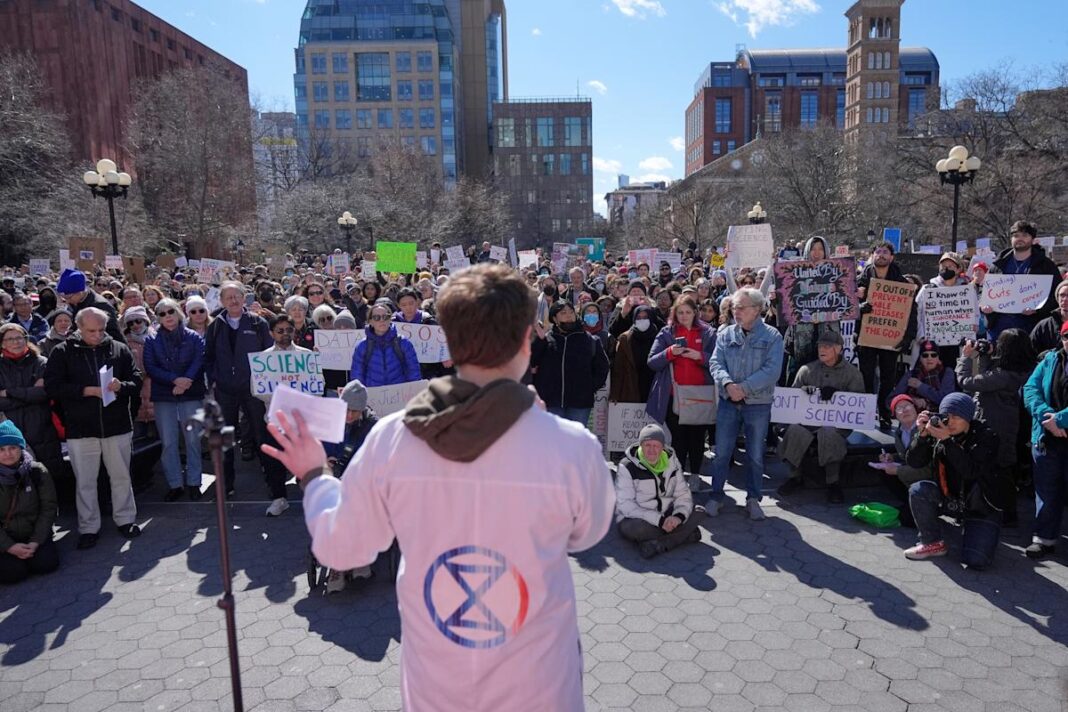“In the pursuit of scientific progress, a chilling reality has set in for aspiring researchers in the United States. The Trump administration’s sweeping cuts to the National Institutes of Health (NIH) have sent shockwaves through the scientific community, forcing many to reevaluate their career aspirations. As funding for groundbreaking research dries up, the next generation of scientists is being forced to consider alternative paths, abandoning their dreams of curing diseases, pushing the boundaries of human knowledge, and driving innovation. The consequences are far-reaching, with the very future of American scientific leadership hanging in the balance. In this opinion piece, we explore the alarming implications of these cuts and the tough choices facing aspiring scientists, as they weigh the risks and rewards of staying the course or seeking new opportunities outside of the lab.”
The Uncertain Future of Scientific Research

The Trump Administration’s funding cuts have sent shockwaves through the scientific community, leaving young researchers like Connor Phillips in limbo. Phillips, a research fellow at the National Institutes of Health (NIH), was poised to continue his work studying brain processes through a partnership with Brown University. However, the suspension of training programs at NIH due to funding cuts has forced him to apply to other programs, hoping that policies might be reversed.
The reduction in federal support for research has far-reaching implications for career prospects. Universities are cutting back on offers of admission for graduate students due to funding uncertainty, while many are freezing hiring as the Trump administration threatens to take away federal money over various issues.
Connor Phillips’ Story: From NIH Research Fellow to Uncertain Future
Phillips’ journey is a testament to the impact of funding cuts on young scientists. Born three months premature with cerebral palsy, Phillips’ life was saved by the very science he sought to pursue. His passion for helping others drove him to take on demanding jobs with long hours, but the funding cuts have put his future in jeopardy.
“You don’t take these jobs that pay worse and have insane hours and are really stressful unless you care about helping others and taking our love for science and translating that into something that can improve people’s lives,” Phillips said.
Reductions in Federal Support for Research and its Effects on Career Prospects
The Trump administration’s cuts to federal support for research at universities and institutions are dimming young scientists’ prospects, cutting off pathways to career-building projects and graduate programs. The uncertainty has led to a ripple effect, with universities cutting back on offers of admission and freezing hiring.
Students like Phillips are being forced to pivot from carefully laid plans, applying to other programs and hoping for a reversal of policies. The psychological impact of funding uncertainty is taking a toll on young researchers, leaving them feeling uncertain and frustrated.
The Ripple Effect on Graduate Programs and Research Institutions
The funding cuts have had a devastating impact on graduate programs and research institutions. Universities are cutting back on offers of admission, while many are freezing hiring due to the uncertainty surrounding federal funding.
Universities Cutting Back Offers of Admission due to Funding Uncertainty
Emilya Ventriglia, president of UAW 2750, the union representing around 5,000 early-career researchers at NIH facilities, noted that admissions in some graduate programs have been cut in half or paused altogether. She warned that if the hiring freeze is not lifted soon, there may be no Ph.D. students next year.
“At this rate, with the hiring freeze, there may be no Ph.D. students next year if it’s not lifted soon, because usually people make their decisions by April,” Ventriglia said.
Freezing of Hiring and its Implications for Early-Career Researchers
The freezing of hiring has far-reaching implications for early-career researchers like Ventriglia, who is unable to continue recruiting another researcher she planned to mentor this spring. The new purchasing restrictions and firings of employees who processed those purchases mean she will be unable to acquire reagents she needs for experiments.
“We’re expecting this to play out for generations,” said Levin Kim, the president of a union that represents 8,000 academic workers at the University of Washington.
Implications for the Scientific Community
The financial burden of pursuing a career in scientific research has long been a pressing concern for aspiring scientists. However, the recent funding cuts by the Trump administration have exacerbated this issue, leaving many young researchers feeling uncertain about their future in the field.
The Long-term Consequences of Funding Cuts
The potential loss of talent and expertise in the scientific community is a significant concern. As funding cuts continue to affect research institutions, many young scientists are being forced to reconsider their career choices. This could lead to a brain drain in the scientific community, as top talent seeks out more stable and secure opportunities.
Furthermore, the U.S. may no longer be seen as a prime destination for researchers. Historically, the country has attracted top talent from around the world, but with funding cuts and uncertainty, this may no longer be the case. This could have long-term consequences for the country’s scientific progress and innovation.
The Importance of Reversing Funding Cuts
Preserving the integrity of scientific research and its applications is crucial for advancing our understanding of the world and improving people’s lives. Funding cuts not only affect the researchers themselves but also have a ripple effect on the entire scientific ecosystem.
Policy changes are necessary to support young scientists and ensure that they can continue to pursue their passion for research. This includes providing stable funding, opportunities for growth and development, and a supportive research environment.
Conclusion
In conclusion, the Trump administration’s cuts to the National Institutes of Health (NIH) have sent a resounding message to aspiring scientists: the path to a career in research is increasingly uncertain. As a result, many are now considering alternate career paths, citing concerns about job security, funding, and the future of scientific inquiry in the United States. This trend has significant implications for the country’s ability to drive innovation, address pressing health concerns, and maintain its position as a global leader in scientific research.
The implications of this trend extend far beyond the individual scientists affected. The loss of talented researchers will have a ripple effect throughout the scientific community, leading to a brain drain that will be felt for generations to come. Moreover, the reduction in research funding will stifle progress on critical health issues, leading to real-world consequences for patients and families affected by diseases and disorders. As the scientific community struggles to adapt to this new reality, it is imperative that policymakers and stakeholders take a hard look at the long-term consequences of these cuts and work to create a more sustainable, supportive environment for researchers.
As we move forward, it is imperative that we prioritize the needs of our nation’s scientists and researchers. We must recognize the value of their work and invest in their futures, lest we risk losing a generation of talented individuals to more stable, lucrative careers. The future of scientific progress hangs in the balance, and it is our collective responsibility to ensure that the torch of innovation is passed to the next generation of researchers. Will we rise to the challenge, or will we allow the pursuit of knowledge to wither on the vine? The choice is ours, and the consequences of our inaction will be felt for years to come.
